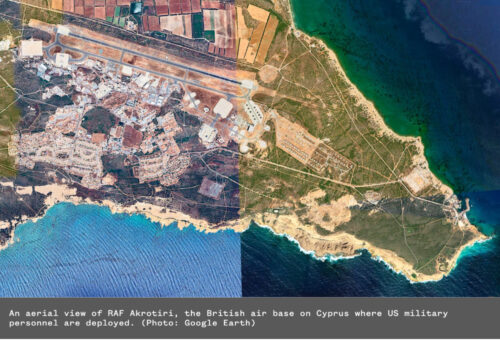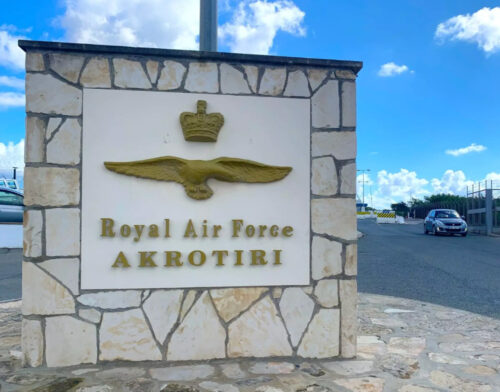Ninety Miles to Damascus

If you missed yesterday, the Writer’s Section was on the way to someplace warm. It may be the cold blast of air that caused some old memories to emerge, or maybe the invisible rays broadcast from that Chinese balloon. Loma had been talking about one of the significant benefits of government travel, since he stopped at Bath, England, which is named after what the Romans did there.
The rest of us were on the train to Swindon on the Bristol Great Northern Road. It was crisp and efficient. The cab was orderly and linear as we sped through villages and farms into the countryside. We eventually wound up at an imposing gate guarded by a businesslike Air Policeman with a loaded sub-machinegun. We had a suspicion the journey was beginning in earnest, and things could get warmer than a beach located the same distance from Damascas as Key West is from la Habana.
We were under orders to be transported by the people who owned the airfield at Akrotiri in the Republic of Cyprus. Which is to say that it was actually Great Britain, as far as the fence-line. It is the same sort of historic accident that enabled the U.S. to operate a military prison in Cuba. A word to the wise: Brit military air has its little idiosyncrasies. First, you are locked up at Brize-Norton for at least fourteen hours before flight time. If you are going to Cyprus, the wake-up call is at 0430. They take your bag when you check on the base, so make sure your spare undies are in your briefcase with your toothbrush. There are no ice machines. You can get a towel, but you need to ask… at the front desk of… The Gateway.
Gateway house is a grim 1950s facility that houses all transient passengers, military officer and enlisted, dependent, civilian and VIP. We were neither fish nor fowl, being mufti Yanks. I got a very narrow bed in a very narrow room (No Smoking or drinking in the room!) The lighting was barely adequate. The head was down the hall. There was one shower on our floor. The babies seemed to be energized about something.
For folks who were used to U.S. Air Force Standards (What! No cable TV in the room! I won’t fly!) this was a rude shock. And ruder still when the claxon went off at 0430…well, at least the pints of lager were acceptable in the officer’s bar the night before…
Then off with my new RAF friends to the terminal, to be cycled through security and finally onto a VC-10 transport. Old, but well maintained. Weird, because the seats in the front faced backward, while the aft cabin faced forward. Very tight quarters. No drink service. Five hours across France, Sardinia. The toe of Italy, Crete and finally a missed approach and into Akrotiri. Veddy British. With good reason. We may have been in Cyprus, but we stand on sovereign British Soil. When we emerge from the Customs House it looks just like southern California. Crisp breeze, palms, brilliant blue sky. Sandy soil. If they were driving on the correct side of the road, we would have felt like we were home, not 90 miles from downtown Damascus.

(The entrance to RAF Akrotiri, Photo: Matt Kennard/DCUK)
Now the history lesson. Cyprus is ancient. Third largest island in the Mediterranean after Sicily and Sardinia, ancient actors such as the Phoenicians, Assyrians, Egyptians, Persians all took their turns as masters. Predominantly Greek and Roman in classic times, the strategic island located only a hundred miles from the Holy Land served as a staging base for Crusaders conducting operations aimed at the re-conquest of Jerusalem. It briefly succeeded.
Later, the Knights of St. John maintained a strategic presence on the island, to be replaced by the trading empire of the Venetians in the Renaissance. The Ottoman Turks occupied the island in 1571, and were in turn replaced by the British in the 1700’s. These disparate cultures have left their mark, both in populace and architecture. According the census run by local officials, the island has a population of about three quarters of a million citizens. About 85% are of Greek extraction, 12% Turkish and the remaining percentage mostly expatriate UK nationals.
After assisting the British against the Axis powers during World War Two, Cypriot leaders believed that independence would be a logical outcome. Instead, failed negotiations led to an armed insurgency against the British was conducted between 1955-59. The U.K. did grant independence in 1960, but in a key codicil to the decree, retained two large areas in the south and east as British Sovereign Areas for special military activities.
Additionally, a small radar station was maintained on Mt. Olympus in the mountainous west. The terms of the “SBA” agreement were very similar to those contained in the original U.S. Bases charter in the Philippines, in which both Subic Bay and Clark AFB were considered U.S. soil.
On Cyprus, due to inter-communal skirmishes in ’63-’64, a “green line” was drawn through the capital of Nicosia. Tension was exacerbated by the external politics of the larger Greek and Turkish states. In 1974, a coup was conducted by the military government of Greece against the Republic of Cyprus. It provided the context for Turkish regular forces to intervene to assure the safety of their ethnic minority. The Turks remain today, about 35,000 strong, and occupy about 40% of the island’s north, including much of the arable land. A UN Observer Force patrols the de-militarized zone. In Famagusta, formerly the island’s top tourist destination, many hotels are now abandoned in the buffer zone, as is a Mercedes dealership with “new” 1974 vehicles resting dusty in the showroom.
Prospects for a Continued British Presence. According to a Wing Commander James of British Forces Cyprus, the U.K. has no intention of changing the terms of the SBA (as the U.S. did prior to departing the Philippines) and has every intention of maintaining this strategic presence.
Comments from other British officers echoed that sentiment. While most acknowledged that situations can change, the UK Government is resolute in supporting the Cyprus presence. Additionally, there is a large and visible British expatriate community on the island, and it remains a popular tourist destination with whom we shared traditional British refreshments. Of interest, the flavor of the Empire is very much alive on the island, and it is easy to forget that very little else remains of the formerly vast overseas British presence.
According to officers assigned to an RAF Signals unit we met, current duty rotations for their community included only the Shetland Islands, the Falklands and Cyprus. The stark contrast in climates makes Cyprus a most desirable posting.
There was some business to be done and we did it. Then we wound up on the beach, looking east. You can’t see it from there, but Syria is right over the horizon. And as a general rule, that is exactly where we prefer it to stay. Ninety miles seems to be a good distance for all sorts of things!
Copyright 2023 Vic Socotra
www.vicsocotra.com
